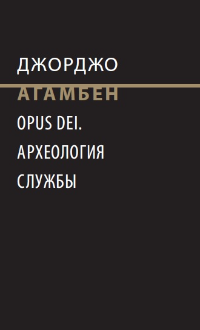Opus Dei. Archaeology of the office. Homo sacer, II, 5

Giorgio Agamben
Opus Dei. Archeologia dell’ufficio. Homo sacer, II, 5
Translated to Russian by S. Ermakov; under scientific editing by D. Raskov, A. Pogrebnyak (with the participation of G. Layus). – Moscow; Saint-Peterburg: Gaidar Institute Press; Faculty of Liberal Arts and Sciences, SPbSU, 2022. – 280 p.
ISBN 978-5-93255-584-2
In this volume of Homo sacer, Giorgio Agamben makes an ambitious attempt to analyze the dual genealogy: the ontologies of reality and the ethics of duty, as they were developed in the history of Western thought. The first was criticized by Heidegger, the second by Schopenhauer and Nietzsche; in his Agamben's research not only relies on them, but seeks to correct and supplement their argumentation. Thus, he demonstrates that the central role in the development of both paradigms is played by Christian worship with its very special understanding of action and effectiveness, as well as the concept of "duty", which came to Christian liturgical thought from the stoic ethics developed by Cicero. Due to such prerequisites, ontology and ethics eventually turn out to be connected in a single circle, which now corresponds to a special subject, literally doomed to the effective performance of actions that do not belong to him. This concept and its consequences, as Agamben shows, actively influence the sphere of politics up to the present day.